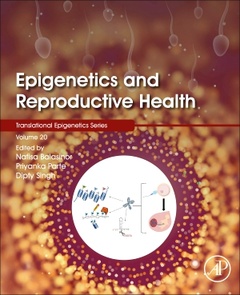Description
Epigenetics and Reproductive Health
Translational Epigenetics Series
Director of collection: Tollefsbol Trygve
Language: English
Keywords
Aging; ART; Breast cancer; Cervical cancer; Chemicals and environmental agents; Chromatin modifications; Chromatin remodeling; Chromatin; DNA demethylation; DNA methylation; DNMT; Embryo; Endocannabinoids; Endocrine disruptors; Endometriosis; Environment; Environmental stress; Epigenetic therapy; Epigenetics; Epigenome reprogramming; Female epigenome; Fertilization; Fetal origin; Folic acid; Gametes; Gene expression; Genetic; Genomic imprinting; Germ cells; Hisotne modification; Histone deacetylases; Histone modification; Histone modifications; Histone modifiers; Histone; Histones; Human germ cell development; Hyperacetylation; ICSI; Imprinted genes; Imprinting; In vitro gametogenesis; Late-onset disease; Lifestyle; Male epigenome; Male infertility; Methylation; microRNA; miRNA; miRNAs; ncRNAs; Nuclear reprogramming; Nutrition; One carbon metabolism; Oocyte; Oocytes; PCOS; PGCLC; Placenta pathologies; Placenta; Polycystic ovary syndrome (PCOS)DOHaD; Preemptive medicine; Preemptive nurturing; Pregnancy complications; Pregnancy disorders; Pregnancy; Preimplantation; Primordial germ cells; Prostate cancer; Protamines; Reproductive health; Reprogramming; Single-cell methylome; Single-cell transcriptome; Sperm RNA; Sperm; Stem cells; Stress; Testicular cancer; Testis specific histones; Transcription factors; Transgenerational effects; Transgenerational epigenetic inheritance; Transgenerational epigenetics; Transgenerational non-mendelian inheritance
444 p. · 19x23.3 cm · Paperback
Description
/li>Contents
/li>Readership
/li>Biography
/li>Comment
/li>
Epigenetics and Reproductive Health, a new volume in the Translational Epigenetics series, provides a thorough overview and discussion of epigenetics in reproduction and implications for reproductive medicine. Twenty international researchers discuss epigenetic mechanisms operating during the formation of male and female gametes, fertilization and subsequent embryo and placental development, particularly in mammals and transgenerational epigenetic inheritance. This volume also addresses aberrant epigenetic changes influencing male and female infertility, pregnancy related disorders, and those potentially linked to therapeutic manipulations and assisted reproductive technologies. Emphasis is placed on identifying biomarkers for early detection of aberrant epigenetic mechanisms.
Later chapters examine the possibility of correcting these epigenetic dysfunctions, as well as current challenges and next steps in research, enabling new translational discoveries and efforts towards developing therapeutics.
SECTION I Spermatogenesis, oogenesis and fertility 1. Epigenome reprogramming in the male and female germ line 2. Genomic imprinting 3. Chromatin remodeling of the male genome during spermiogenesis and embryo development 4. Epigenetic regulation in stem cells 5. Aberrant epigenetics and reproductive disorders
SECTION II Pregnancy/developmental/placental epigenetics 6. Epigenetic reprogramming in the embryo 7. Epigenetic regulation during placentation 8. Epigenetic modulation during pregnancy and pregnancy related disorders 9. Epigenetic involvement in fetal and neonatal origins of late-onset disease
SECTION III Epigenetic – lifestyle, aging and environmental influence 10. Impact of environmental chemicals and endocrine disruptors on mammalian germ cell epigenome 11. Influence of nutrition on reproductive health through epigenetic mechanisms 12. Influence of stress and lifestyle on epigenetic modifications 13. Aging of male and female gametes
SECTION IV Reproductive cancer and epigenetics 14. Testicular and prostate cancers 15. Emerging patterns and implications of breast cancer epigenetics: An update of the current knowledge 16. Ovarian and endometrial cancers 17. Epigenetic aberrations in cervical cancer
SECTION V Epigenetics in diagnosis, prognosis and therapy 18. Natural molecules as epigenetic modifiers in reproduction
Human geneticists; human genomicists; translational researchers in genomic medicine, epigenetics, reproductive biology, endocrinology, molecular biology; life science researchers; oncologists; Obstetricians; pediatricians; immunologists; bioengineers; developmental biologists
- Thoroughly examines the influence of aberrant epigenetics during gametogenesis and embryogenesis, affecting parents, gametes and embryos, offspring and future generations
- Explores health outcomes for reproductive senescence, endocrine disruption, testicular cancer, prostrate cancer, breast cancer, ovarian, cancer, endometrial cancer and cervical cancers
- Features chapter contributions from international researchers in the field




